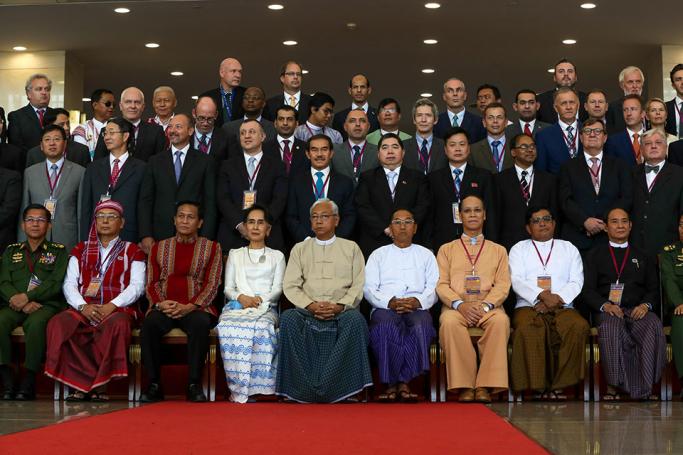Myanmar's Aung San Suu Kyi concluded a landmark peace summit with ethnic rebels on Saturday, calling it the first step on what promises to be a tough road to peace.
The conference in the capital Naypyidaw was Suu Kyi's first big drive to end ethnic minority insurgencies that have rumbled across Myanmar's frontier states for nearly seven decades.
The nobel laureate, who championed a democracy struggle against the former junta, has devoted her first few months in power to kick starting a fresh peace negotiations between rebel militias and the army.
No resolution emerged from the four-day summit, which gave representatives from nearly 20 armed ethnic groups a chance to air grievances and outline their political aspirations.
Suu Kyi's biggest achievement was bringing many key players to the table, including rebel armies that did not sign a shaky ceasefire brokered by the former military-backed government last year.
However three groups still actively clashing with troops did not attend the talks, and the powerful Wa -- a heavily armed militia based on the border with China -- stormed out on day two over what the government said was an organisational mishap.
"To achieve peace is very difficult," Suu Kyi told the conference hall filled with hundreds of delegates on Saturday, the final day of the summit after it was decided a fifth was not needed.
"This is the first meeting. After this, there will be more meetings. And there are many things we have to do during the time in between," she added.
The veteran democracy activist, who spent some 15 years under house arrest during junta rule, urged all sides to "look forward" as the peace process continues.
Distrust of the Tatmadaw, as the Myanmar military is known, runs deep among minorities after half a century of brutal warfare and oppression marked by torture, rape and mass killings.
The conflicts are complicated by tussles over drug trades and lucrative gem and timber reserves in some rebel-held areas.
- Challenges ahead -
While Suu Kyi has backed the minorities' calls for greater autonomy in their homelands, it will be a challenge to craft a federal arrangement that meets each group's unique demands.
Any changes to a junta-era charter will also require support from the still-influential army, which has the power to veto any proposed amendments.
A leader from the Kachin Independence Organisation (KIO) -- a powerful rebel faction that did not sign last year's ceasefire -- stressed Saturday that no concrete agreements were reached at the talks.
"We were able to present our proposals at this conference, but nothing important happened," General Gun Maw told reporters, adding that more discussion is needed before his group will sign a deal.
Myanmar's diverse patchwork of ethnic groups make up around a third of the population, but the government and military have long been dominated by members of the majority Bamar ethnicity, to which Suu Kyi belongs.
The peace summit comes almost 70 years after her independence hero father signed an agreement promising autonomy to major ethnic groups ahead of Myanmar's break from colonial ruler Britain.
But the deal collapsed after his assassination and was ignored by the junta that seized power, triggering uprisings that have simmered in the country's borderlands ever since.
(AFP)
You are viewing the old site.
Please update your bookmark to https://eng.mizzima.com.
Mizzima Weekly Magazine Issue...
14 December 2023
Spring Revolution Daily News f...
13 December 2023
New UK Burma sanctions welcome...
13 December 2023
Spring Revolution Daily News f...
12 December 2023
Spring Revolution Daily News f...
11 December 2023
Spring Revolution Daily News f...
08 December 2023
Spring Revolution Daily News f...
07 December 2023
Diaspora journalists increasin...
07 December 2023
Naungcho to be transformed into tourist destination












